According to doctors, the patient was infected with bacteria due to direct contact with contaminated soil and water.
Multiple organ failure due to flesh-eating bacteria infection
About three weeks before being hospitalized, with symptoms of prolonged fever and body aches, Mr. LSH (36 years old, in Thanh Hoa) bought and used fever-reducing medicine at home for 10 days but it did not help.
Mr. H then went to a local medical facility for examination and was prescribed outpatient medication. However, his condition did not improve, his fever continued to rise and his difficulty breathing became increasingly severe.
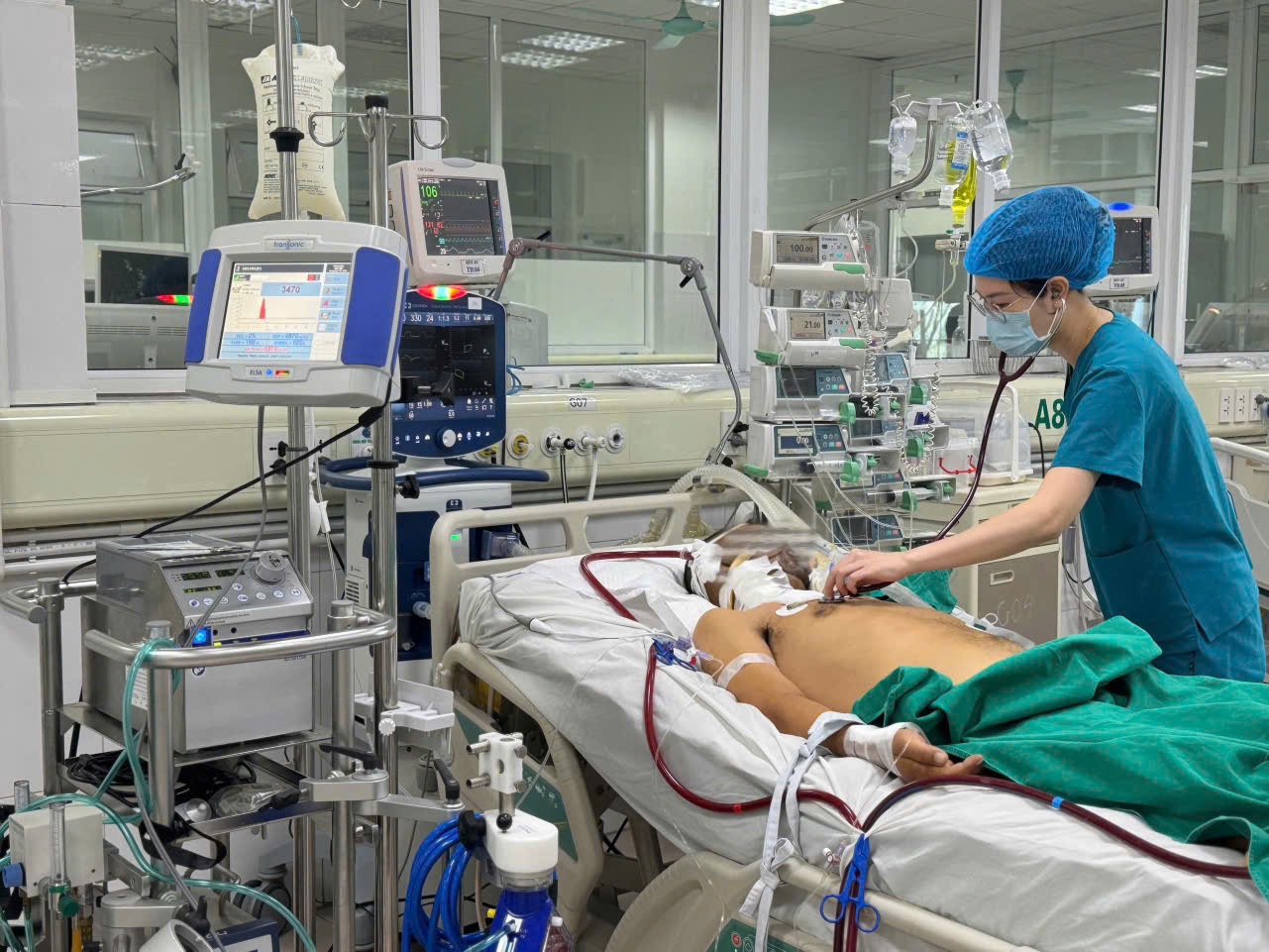
Patient in critical condition due to flesh-eating bacteria infection. (Photo: MT).
On November 3, he was transferred to the provincial hospital, diagnosed with infectious fever, had to be intubated, put on a ventilator and had to undergo continuous blood filtration.
Blood culture results identified Burkholderia pseudomallei, the causative agent of Whitmore's disease.
After 6 days of intensive treatment but without much improvement, Mr. H was transferred to the Central Tropical Hospital with a diagnosis of septic shock, multiple organ failure, sepsis caused by B.pseudomallei and diabetes.
According to his family, he worked as an excavator and was diagnosed with diabetes a year ago but was not regularly monitored and treated.
At the Emergency Department, Central Hospital for Tropical Diseases, the patient was treated with combined antibiotics, antifungals and continuous blood filtration.
However, after only a few days, the patient developed subcutaneous emphysema in the neck and chest area.
X-ray and CT scan results showed pleural and mediastinal air, causing acute cardiac tamponade. Mr. H underwent surgery to open the mediastinum to relieve the pressure.
However, the patient's respiratory and circulatory failure did not improve, and he was placed on VV ECMO (extracorporeal membrane oxygenation) for support.
The patient was then transferred to the Intensive Care Unit in a state of septic shock, multiple organ failure (including liver failure, kidney failure and respiratory failure), vasomotor maintenance and continuous blood filtration.
Bronchoscopy revealed a lot of pus and pseudomembranes covering the bronchial mucosa, a serious consequence of Whitmore bacteria causing lung damage.
MSc. Dr. Le Thi Huyen, Department of Intensive Care, informed: "Currently, the patient still has to use VV ECMO and continuous blood filtration.
Circulatory function has improved without the need for vasopressors, but pulmonary function remains very poor and requires active monitoring and support.
The patient's kidney condition has shown signs of improvement, but dialysis is still needed...".
Be careful when working in polluted environments.
According to Dr. Huyen, patient H works in an environment in direct contact with contaminated soil and water, combined with an underlying medical condition of uncontrolled diabetes, creating conditions for disease-causing bacteria.
Whitmore is a dangerous disease that progresses silently, often in subacute form with atypical symptoms such as prolonged fever. This makes it difficult for patients to recognize and access early treatment...".
There is currently no vaccine to prevent Whitmore's disease, so the main prevention measure is to avoid direct contact with contaminated soil and water sources.
Do not bathe, swim, or dive in polluted ponds, lakes, or rivers. Ensure personal hygiene, wash your hands frequently with soap and clean water, especially before and after preparing food, before eating, after using the toilet, and after working in the fields.
When there are open wounds, ulcers or burns, avoid contact with potentially contaminated soil or water.
If contact is unavoidable, use waterproof tape and wash thoroughly to ensure hygiene.
"In particular, people with underlying diseases such as diabetes should limit direct contact with contaminated soil and water.
If you have to work in a high-risk environment, you need to wear full protective gear, including gloves, boots and protective clothing.
When experiencing unusual symptoms such as prolonged fever, you should immediately go to a medical facility for examination and timely treatment, and avoid taking medication at home on your own," Dr. Huyen advised.
Source: https://www.baogiaothong.vn/nguoi-dan-ong-lai-may-xuc-nguy-kich-vi-bi-vi-khuan-thit-nguoi-tan-cong-192241120105144365.htm


![[Photo] Magical moment of double five-colored clouds on Ba Den mountain on the day of the Buddha's relic procession](https://vphoto.vietnam.vn/thumb/1200x675/vietnam/resource/IMAGE/2025/5/9/7a710556965c413397f9e38ac9708d2f)







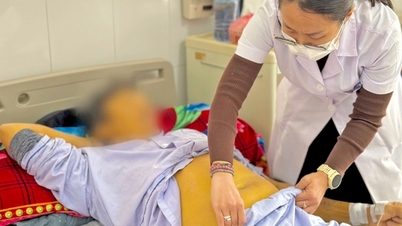




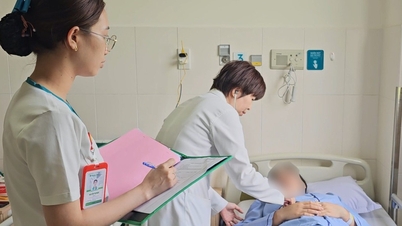
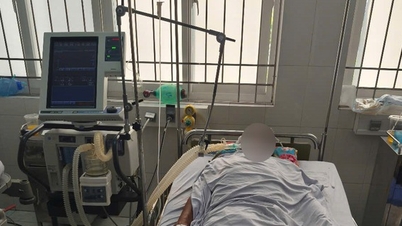


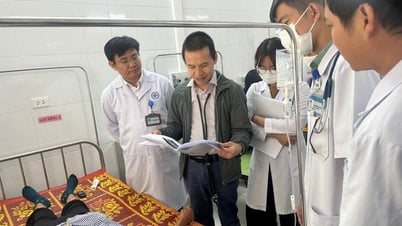
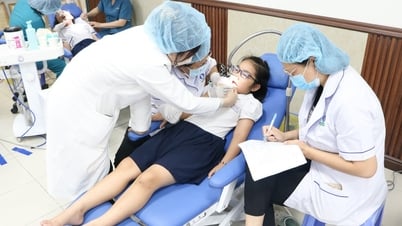













![[Photo] General Secretary To Lam begins official visit to Russia and attends the 80th Anniversary of Victory over Fascism](https://vphoto.vietnam.vn/thumb/1200x675/vietnam/resource/IMAGE/2025/5/8/5d2566d7f67d4a1e9b88bc677831ec9d)












































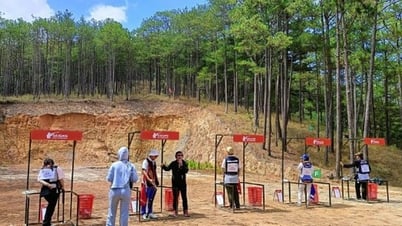























Comment (0)